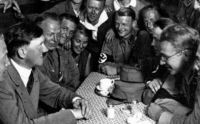 Hitler was released from Landsberg prison in December 1924 after serving only six months of his sentence. At that time, the Nazi Party and its associated newspapers were banned by the government and Hitler himself was forbidden from making public speeches. The support for National Socialism was waning throughout Germany, their voting figures in elections fell from almost two million in 1924 to 810,000 by 1928 (this gave them only 12 out of a total of 491 representatives in Parliament). However at the same time, Hitler succeeded in increasing the party membership and developed the organization of the party throughout Germany with the help of Gregor Strasser who was responsible for the organization of the Nazi Party in northern Germany. During this period Hitler also created the infamous SS (Schutzstaffel) which was initially intended to be Hitler's bodyguard under the leadership of Heinrich Himmler.
Hitler was released from Landsberg prison in December 1924 after serving only six months of his sentence. At that time, the Nazi Party and its associated newspapers were banned by the government and Hitler himself was forbidden from making public speeches. The support for National Socialism was waning throughout Germany, their voting figures in elections fell from almost two million in 1924 to 810,000 by 1928 (this gave them only 12 out of a total of 491 representatives in Parliament). However at the same time, Hitler succeeded in increasing the party membership and developed the organization of the party throughout Germany with the help of Gregor Strasser who was responsible for the organization of the Nazi Party in northern Germany. During this period Hitler also created the infamous SS (Schutzstaffel) which was initially intended to be Hitler's bodyguard under the leadership of Heinrich Himmler.
The collapse of the Wall St. stock exchange in 1929 led to a world wide recession which hit Germany especially hard. All loans to Germany from foreign countries dried up, German industrial production slumped and millions were made unemployed. These conditions were beneficial to Hitler and his Nazi campaigning. By July of the following year Chancellor Bruening, without a parliamentary majority in the Reichstag, was unable to pass a new finance bill and was forced to ask President Hindenburg to dissolve the Reichstag and call for new elections for the coming September. Hitler campaigned hard for the Nazi candidates, promising the public a way out of their current hardship. When the results of the election were announced, the Nazi Party had won 6.4 million votes which made them the second largest party in the Reichstag. At this time Hitler also began to win over the support of both the army and the big industrialists, the latter contributing substantially to the finances of the Nazi Party.